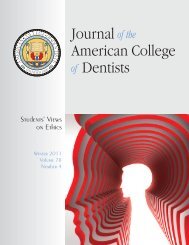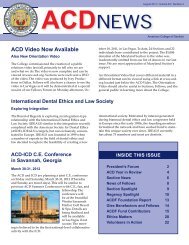JACD 71-4 - American College of Dentists
JACD 71-4 - American College of Dentists
JACD 71-4 - American College of Dentists
- No tags were found...
You also want an ePaper? Increase the reach of your titles
YUMPU automatically turns print PDFs into web optimized ePapers that Google loves.
Issues in Dental Ethics<br />
56<br />
was a consistent or telling pattern to<br />
their behavior or their psychological<br />
makeup. I was looking for something<br />
that would explain how they made such<br />
terrible decisions and got them into<br />
trouble, something that I could share<br />
with others to keep them out <strong>of</strong> trouble.<br />
It turns out there is a pattern. In my<br />
experience, the majority <strong>of</strong> these dentists<br />
got into trouble because <strong>of</strong> a lack <strong>of</strong><br />
assertiveness in some way, shape, or<br />
form. Some were not able to say “no” to<br />
inappropriate patient requests. Others<br />
were unable to say “no” to demands<br />
from their own families. Some could not<br />
stand up to staff members who did<br />
things that were wrong. Then, in most<br />
cases, once the dangerous bad-decision<br />
ball was rolling, they could not step up,<br />
take the hit, and stop the process before<br />
it became a juggernaut that rolled over<br />
them and crushed them.<br />
<strong>Dentists</strong> need to teach themselves<br />
(beforehand) what to say in difficult<br />
situations, especially in uncomfortable<br />
ones. And then they need to say it. This<br />
means learning to say “no” appropriately,<br />
A dentist should not<br />
work on patients, but<br />
rather work with them.<br />
and learning to face difficult conversations<br />
instead <strong>of</strong> avoiding them. This is a<br />
skill that can be learned. Few are born<br />
with it, few possess it naturally, but a<br />
dentist absolutely needs it to practice<br />
ethically and, in fact just to survive in<br />
practice. And if you cannot figure out<br />
what to say ahead <strong>of</strong> time, at least take<br />
time to reflect afterwards on difficult<br />
conversations you have had and then<br />
rehearse for the next time they come up.<br />
Principle 7: Consult<br />
Another way to avoid the pr<strong>of</strong>essional<br />
failure is to stay connected with your colleagues<br />
and the pr<strong>of</strong>essional community.<br />
A dentist who isolates himself or herself<br />
in a small, individual practice is making<br />
a real mistake.<br />
There are many ways to stay<br />
connected with other dentists, and some<br />
dentists are very good at this. Join or<br />
form a study club, become active in the<br />
local pr<strong>of</strong>essional organization, take<br />
extra continuing education courses, read<br />
widely in the field to remain energized<br />
and creative, and, most <strong>of</strong> all, find a<br />
couple <strong>of</strong> colleagues to trust and talk to<br />
when you are not sure what to do. Call<br />
them on the phone, lunch or jog with<br />
them, and when you get stuck, ask them<br />
for an opinion. Be sure to speak with<br />
them if you find yourself faced with a<br />
challenging ethical problem. Talk it over.<br />
Consult. Make this a regular thing in<br />
your pr<strong>of</strong>essional life.<br />
Principle 8: Manage Your Stress<br />
and Your Life<br />
<strong>Dentists</strong> have chosen a career that is full<br />
<strong>of</strong> promise, but it is not an easy career.<br />
Some dentists find the work to be too<br />
taxing after a certain number <strong>of</strong> years,<br />
so they leave it, or if not, they grow to<br />
resent it, or they use drugs as an escape.<br />
The duty to remain fresh and energized<br />
is every bit as important as the duty to<br />
learn about new scientific developments<br />
or technical innovations. It is neither<br />
wise nor fair to treat patients when you<br />
hate your work or are numb to it or are<br />
just going through the motions.<br />
<strong>Dentists</strong> need to learn how to manage<br />
their responsibilities, opportunities, and<br />
energies productively, so that they can<br />
enjoy the entire span <strong>of</strong> their careers.<br />
They need to figure out, each according<br />
to his or her own values and vision <strong>of</strong><br />
life, where the pr<strong>of</strong>ession and the work<br />
fit into the big picture, and then create a<br />
work style consistent with that vision.<br />
They also need to be aware when their<br />
personal resources are not up to this<br />
task and seek advice and support when<br />
they need it. <strong>Dentists</strong> are typically<br />
“hard-chargers” who can “work like a<br />
dog.” They would not have made it<br />
through dental school otherwise. But to<br />
work yourself into the ground without<br />
knowing what you are working for is<br />
asking for trouble. This means pacing<br />
yourself intelligently so that you can<br />
really appreciate your practice and the<br />
people around you. Your patients, your<br />
family, and your friends count on you<br />
to be sane and fully present. This is a<br />
lifelong challenge.<br />
What Principle 8 does is remind you<br />
to pay attention to your life and your<br />
consciousness, along with the other<br />
seven principles, each time you put on<br />
that coat.<br />
The white coat is a symbol <strong>of</strong> all<br />
this. It is a symbol for the members <strong>of</strong><br />
the dental pr<strong>of</strong>ession, and it is also an<br />
important symbol for patients, their<br />
families, the whole community that turns<br />
to the dental pr<strong>of</strong>ession for technically<br />
expert and for humane, respectful, ethical,<br />
attentive care. When you put your coat<br />
on each day, remember these eight<br />
principles and the responsibility that<br />
comes with wearing that coat. Then<br />
wear it with pride. ■<br />
2005 Volume <strong>71</strong>, Number 4





